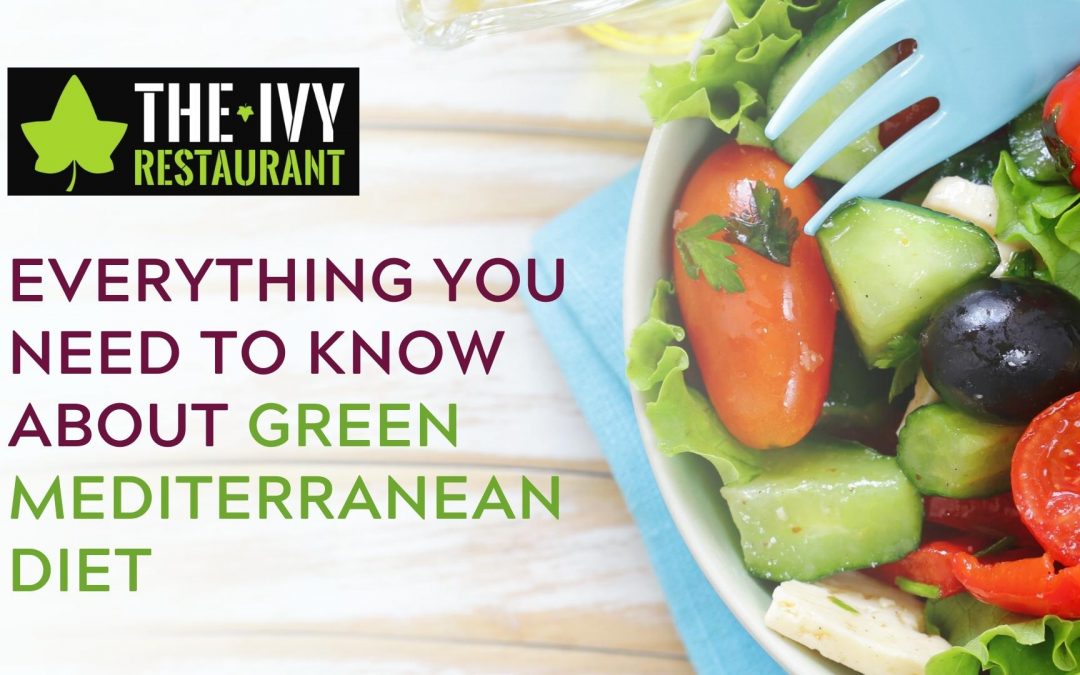Perhaps you are familiar with one of the world’s most popular healthy diet – the diet – the Mediterranean diet. A diet rich in whole grains, fruits, vegetables, legumes, fish, and healthy fats such as nuts and olive oil that also includes some dark chocolate, red wine and restricts red meat, processed foods, and added sugars. The Mediterranean diet also ranked 1st in Best Plant-Based Diets, Best Heart-Healthy Diets, Best Diabetes Diets, Best Diets for Healthy Eating, and the Best Diets Overall for 2021 by U.S. News and World Report. But this Mediterranean diet can get even better. In the trial, researchers found that following a “Green Mediterranean Diet” for 6 months, results in a decrease in the measures of “bad” LDL cholesterol, diastolic blood pressure, and inflammatory markers compared to classic Mediterranean diet or adhering to a general healthy diet advice.
Weight loss between the two diet groups is similar, i.e., 14 pounds (6.35 kg) (lbs) in the green Mediterranean diet and 12 lbs (on average) in the classical Mediterranean diet – though the green group enables a higher reduction in waist circumference in men. But what basically the Green Mediterranean is, and how does it differ from the classic Mediterranean diet?
Difference Between Green Mediterranean and Classic Mediterranean Diet
The traditional Mediterranean diet follows the traditional eating patterns of Mediterranean cultures.
- Large amounts of: Fruits and vegetables, whole grains, beans, herbs, spices, and healthy fats from nuts, seeds, and olive oil.
- Moderate amounts of: Dairy, fish, red wine
- Low amounts of: Red meat and eggs, processed foods, refined grains, added sugars
The resulting combo platter is potent in polyphenols, heart-healthy unsaturated fats and fiber, that improves insulin sensitivity, lower bad cholesterol, and reduces chronic inflammation. The “green” addition takes this plan – reduces meat, and promotes plant-based proteins. You can include some fish and poultry, along with dairy products, and the diet encourages walnuts, green tea, and Mankai duckweed. Duckweed – a type of aquatic plant, rich in protein, iron, and vitamin B12, that makes it a good meat substitute. In a November 2020 study, Scientists said this combination might amplify the Mediterranean diet health benefits even more.
To study this, the researchers tapped 294 people with an average age of 51 and abdominal obesity to embark on one of these diets:
- An overall “healthy diet”
- A calorie-restricted classic Mediterranean diet that includes less red meat and 28 gms of walnuts (1/4 cup) daily
- A calorie-restricted Mediterranean diet that includes 28 gms of walnuts (1/4 cup) per day, 3-4 cups of green tea, and 100gms of Mankai duckweed shake and no red or processed meats and little (if any), poultry.
According to Meir Stampfer, MD, DrPH, professor of epidemiology and nutrition at the Harvard, “The Mediterranean diet has many benefits, but we thought it can be improved through addition of more foods rich in polyphenols and further reducing red meat”.
Pros of Green Mediterranean Diet
- The diet leads to more weight loss and green metabolic wins than standard “eat healthy” advice.
- Largest reduction in waist circumference and other biomarkers of heart disease risk (including lower bad cholesterol, lower blood pressure, better insulin sensitivity, and less chronic inflammation).
- Helps lose fat in liver – an important factor for all humans, specifically the 25% who have nonalcoholic fatty liver disease that progress into cirrhosis and liver failure.
- This diet also offers the highest amount of protection against atrophy that lowers risk for dementia.
That’s because the Mediterranean diet menu slows the shrinkage of the hippocampus. (Hippocampus – a portion of the brain that impacts our ability to remember and learn).
Cons of Green Mediterranean Diet
One drawback of the green Mediterranean diet – it’s not as flexible as the traditional Mediterranean diet. You’ll follow a set plan having a specific calorie and carb allotment, and high-protein quota to reach. You might find that it’s not right for you because of food preferences, eating style, or availability of specialty ingredients. Switching to duckweed might be difficult for some people because Mankai as fresh, frozen cubes turns into a shake, but it can be a tough ingredient to access. Expert dieticians suggest – it’s important to consult your healthcare provider before making any major change to your diet. Further, they say this diet might not be suitable for those with history of eating disorders.
Working of Green Mediterranean Diet
The diet is low in carbohydrates and calories, and high in protein. According to the authors of Heart Study, a sample day aims for 1500 calories per day for men and 1200-1400 calories per day for women that including 40 g of carbs and 100 g of protein. After 2 months, carbohydrate intake increases to 80 g per day. Further, researchers found an X-factor in what made other diets healthy – antioxidant-rich plant compounds called polyphenols.
For this reason, Green Mediterranean diet emphasizes on several high-polyphenol foods, including Mankai duckweed, olive oil, green tea, almonds, red onions, and broccoli.
Green Mediterranean Diet for Weight Loss
As it’s a low-calorie diet that minimizes processed foods and emphasizes whole foods also helps in weight loss. After six months, people following this diet lose an average of 14 lbs, while the ones following the classical Mediterranean diet loses 12 lbs. The authors note that the amount of weight loss was quite similar between the groups, it was 4 times higher than the control group that lost only 3 lbs. Men following the diet lose more belly fat than males following the classical diet. Reduced excess belly fat help lowers the risk of type 2 diabetes, heart disease and stroke.
As the authors find out in the study, dieters followed the green Mediterranean diet for 6 months, a time in which most participants lose weight quickly. After that initial loss, dieters tend to slowly regain weight. Ideally, more research is required to know the long-term weight loss potential of this diet.
Diet Food List to Follow
The diet emphasizes the consumption of plant-based protein through a Mankai shake. If you can’t find Mankai easily, there are plenty of other plant-based protein sources you can incorporate in your diet, such as tofu, beans, nuts, and peanut butter.
Other hallmarks of the diet include a serving of walnuts daily and 3-4 cups of green tea. Some other foods to eat:
- Water
- Green tea
- Duckweed or plant-based protein powder
- Nonstarchy vegetables, such as broccoli, green beans, cauliflower, and onions
- Leafy greens
- Tomatoes
- Fruit
- Eggs
- Cottage cheese
- Yogurt
- Almonds
- Walnuts
- Olive oil
- Tahini
- Herbs
- Spices
- Fish and poultry (limited amounts)
Foods to avoid:
- Processed meat
- Red meat
- Highly processed foods (snack foods like chips, cereals, and crackers)
- Desserts
- Soda and other sweetened beverages
Role of Exercise on the Green Mediterranean Diet
In the study, dieters received the 18-month free gym memberships and educational sessions, with the goal to entice them to participate in moderate-intensity physical activity.
80% of that exercise was aerobic exercise. Initially, participants were instructed to start with 20 minutes a day pf aerobic exercise at a moderate pace, i.e., 65% of maximum heart rate, increasing duration and intensity.
Eventually, participants worked up to 45-60 minutes of aerobic exercise 3-4 times per week, and once a week strength training, comprised of two sets of weighted exercises such as push-ups and squats.
The U.S. Department of Health and Human Services recommends, regardless of what eating plan you’re following, adults aim for at least 150 minutes of moderate-intensity exercise per week, or at least 75 minutes of high-intensity exercise per week.
They also recommend participating in muscle-strengthening activities that engage all muscle groups at least two days a week.
Final Words
As examined in the heart study, the green Mediterranean diet is more of a prescribed plan. As more research is to be performed of this Mediterranean diet, it’s not possible to say what may be the long-term effects of this diet. However, unlike stricter diets such as the paleo diet or keto diet, the green Mediterranean doesn’t need to be an all-or-nothing eating plan. You can take elements of the green Mediterranean diet and apply it to a traditional Mediterranean diet – that could help you stick with it easily while reaping some health benefits. Palmer says,“The researches supports the classical Mediterranean diet, but highlights food like leafy greens. Sometimes you don’t have to follow the prescription, but stick to the basics.
For instance, start drinking green tea, make nuts a daily snack or focus on eating more greens and cutting out meat and animal products. At last, adding healthy choices to a diet that are healthy enhances its benefits more. The Mediterranean diet itself is a suitable long-term diet with proven health benefits – either you embrace it as is, or lean into “green” twist. As Shai notes, “People first have to love what they eat, feel comfortable with this green lifestyle and be sensitive to their personal response.



Recent Comments